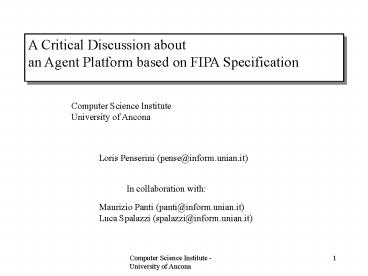Nessun titolo diapositiva - PowerPoint PPT Presentation
1 / 19
Title: Nessun titolo diapositiva
1
A Critical Discussion about an Agent Platform
based on FIPA Specification
Computer Science Institute University of Ancona
Loris Penserini (pense_at_inform.unian.it)
In collaboration with
Maurizio Panti (panti_at_inform.unian.it) Luca
Spalazzi (spalazzi_at_inform.unian.it)
2
Presentation Index
Introduction FIPA Reference Model Communicatio
n Protocol Agent Communication Channel
(ACC) and Agent Management System
(AMS) Directory Facilitator (DF) Conclusions
3
Introduction
Network technologies.
Challenge sharing information.
The Agent Paradigm.
4
Introduction
An Agent could not survive in the current
network environment.
Agents
Agents
The network
Agents
5
Introduction
It needs a software environment that supports
agent cooperation.
Agent Platform 2
Agents
The network
Agents
Agent Platform 3
6
Introduction
Some proposals for agent cooperation
- Knowledge Query and Manipulating Language (KQML)
- (ARPA Knowledge Sharing Effort Group)
- Foundation for Intelligent Physical Agent (FIPA)
- (URL http//www.fipa.org/)
- Some commercial tools
- Aglets (IBM) - VisiBroker
(Borland/Inprise) - Voyager (ObjectSpace)
7
FIPA Reference Model
Agent Platform (AP) architecture.
AP 1
AP 2
?
?
DF
DF
AMS
AMS
ACC
ACC
Agents
Agents
The network
IIOP
IIOP
IIOP
?
ACC
AMS
DF
Agents
AP 3
8
Communication Protocol
FIPA Specification
FIPA defines two types of communication
- Intra-platform
No constraints
- Inter-platform
Internet Inter-ORB Protocol
CORBA allows several mechanisms in
order to locate distribute objects, which are
incompatible each other, but FIPA does not
specify which one must be used.
9
Communication Protocol
AP prototype implementation
Intra-platform protocol IIOP
- IIOP is a well known standard.
- Code Portability.
- ACC is simpler.
10
Communication Protocol
AP prototype implementation CORBA mechanisms
- Interoperable Object Reference (IOR)
- Transient Name Service (TNS)
Wide compatibility with other FIPA compliant
platforms.
11
Agent Communication Channel (ACC) and Agent
Management System (AMS)
FIPA Specification
ACC and AMS strictly interact each other.
ACC supports two kinds of request
- implicit ACC request
- explicit ACC request (forward action)
12
ACC and AMS
Agent_j
ACC
AMS
Agent_i
1 request for Agent_j
2 request
3 agree
4 authenticate
5 inform
6 request from Agent_i
7 agree for Agent_i
8 request
9 agree
10 authenticate
11 inform
12 agree from Agent_j
13 inform done for Agent_i
14 request
15 agree
16 authenticate
17 inform
18 inform done from Agent_j
13
ACC and AMS
AP prototype implementation
ACC and AMS are realised as a single agent
- It removes the interaction between ACC and AMS.
- It does not decrease fault-tolerance capability
of the platform.
- It is still FIPA compliant.
14
ACC and AMS
AP prototype implementation
We only use implicit requests.
- It reduces the overload for the ACC.
- It is still FIPA compliant.
15
Directory Facilitator (DF)
FIPA Specification
The DF provides a yellow-pages service. The
agents registered at the DF are classified by
means of service-type and service-name. A
Domain is the set of all the agents registered at
the DF. The Agent Universe is the union of all
the domains. Each Agent Platform must have at
least one DF (the default DF).
16
Directory Facilitator (DF)
AP prototype implementation
Specification are not clear on what default DF
can contain and which kind of service-name it
must use.
default DF
Service Type Level
FIPA-DF
FIPAACC
FIPA AMS
Service Name Level
Railway
Airport
Agent DF Level (GUID)
DF_j
DF_k
DF_i
Logic structure of the default DF.
17
Directory Facilitator (DF)
AP prototype implementation example
Agent Platform
1Search for a domain
Agent_i
DF Default
2Answer with DF_j address
3Search for an agent
5Invoke the service
6Results
4Answer with agent address (Agent_k)
Fig. 9 A possible situation in which Agent_i
would like to utilise a service that can perform
the Wrapper_i, but at the begin Agent_i doesnt
know that.
DF_j
Agent_k
18
Conclusions
FIPA is an effective solution to agent
cooperation in heterogeneous and distributed
environments. Nevertheless FIPA specification are
not clear
- Communication protocols intra-platform and
inter-platform
- ACC and AMS they have a strictly interaction
and ACC is overburdened by the forward action
- Default DF its role and organisation are not
clear.
AP implementation works at iiop//193.205.129.
41900/acc
19
Future Development
- The integration of the Agent Platform with the
Web.
- The use of mediator agents to integrate
heterogeneous and dynamic information sources.































